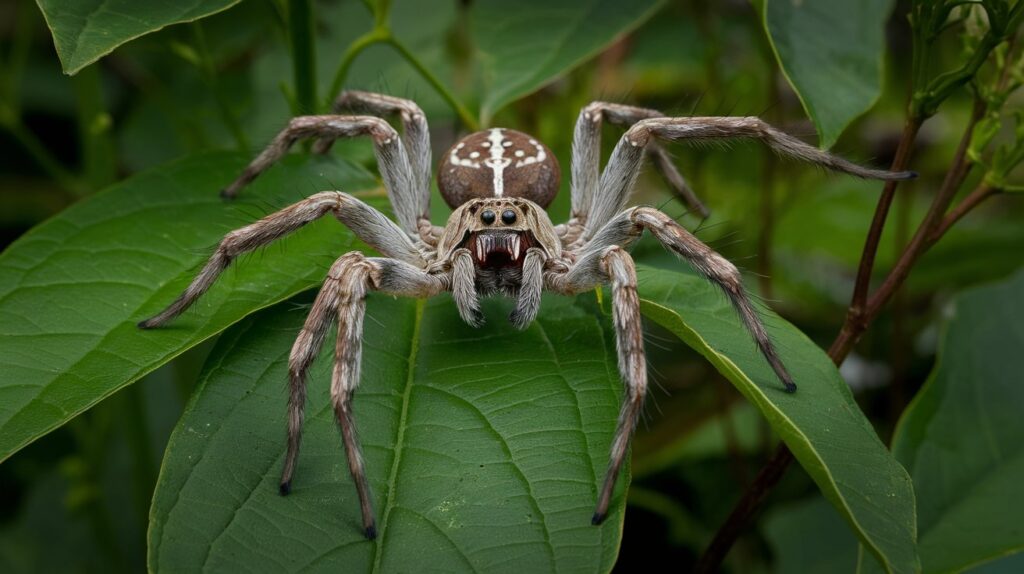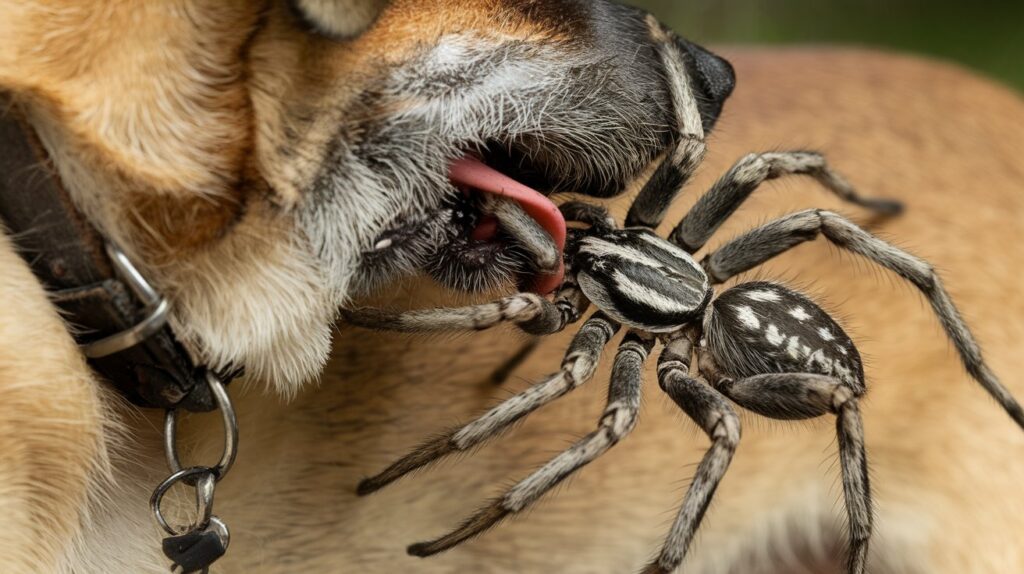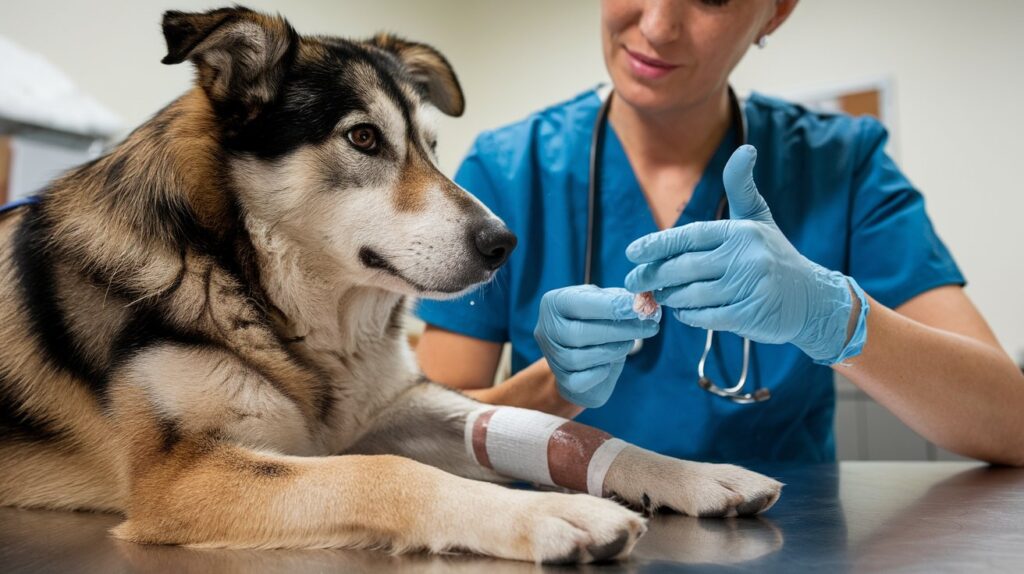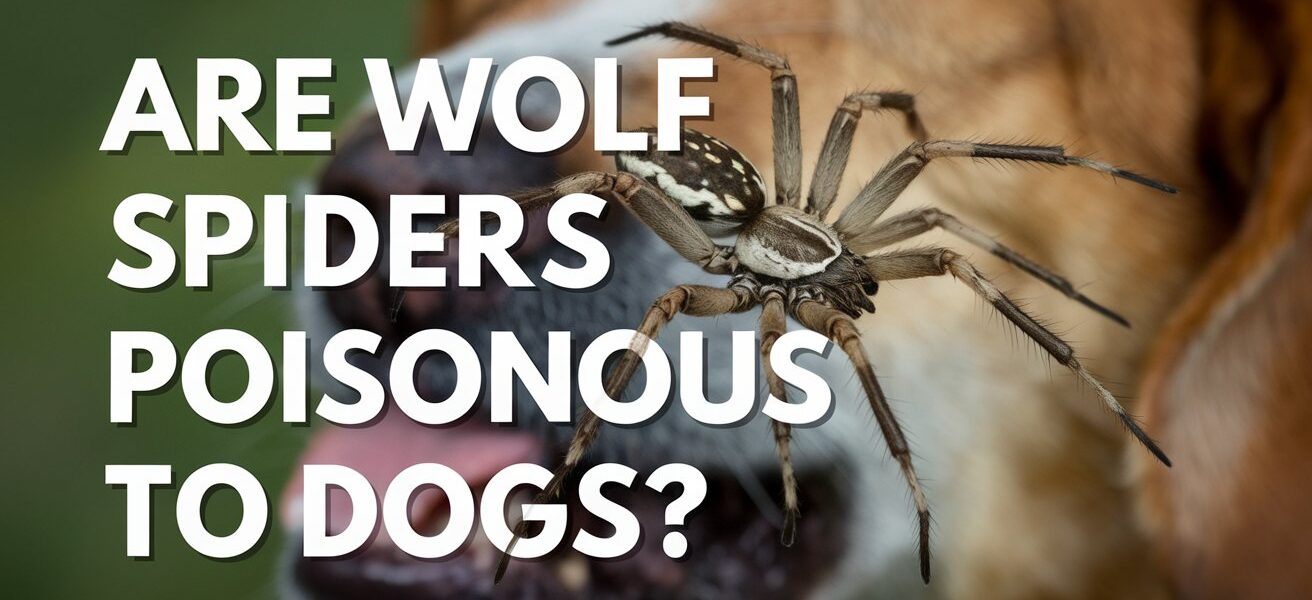
Are Wolf Spiders Poisonous To Dogs?
Wolf spiders are not highly poisonous to dogs. While they carry venom, a bite from a wolf spider typically causes only mild symptoms such as localized pain, swelling, redness, or itching. Most dogs will recover without medical intervention. However, if your dog shows signs of a more severe reaction, such as excessive swelling or difficulty breathing, it’s best to consult a veterinarian.
What Are Wolf Spiders?
Wolf spiders belong to the Lycosidae family, and they are often mistaken for other dangerous spiders due to their large, hairy bodies. However, wolf spiders are not considered highly venomous to humans, unlike black widows or brown recluse spiders. These spiders are commonly found in gardens, forests, and even urban areas where they prey on insects.
Wolf spiders get their name from their hunting style, which resembles that of wolves. Rather than building webs to trap prey, they actively chase and pounce on their targets. This hunting method, combined with their agility and speed, makes them stand out from other spiders.
Are Wolf Spiders Dangerous to Dogs?
The primary concern for dog owners is whether wolf spiders pose a danger to their pets. While wolf spiders do carry venom, they are not highly toxic to dogs. In most cases, a wolf spider bite will cause mild to moderate symptoms that resolve on their own without medical intervention.

What Happens if a Dog is Bitten by a Wolf Spider?
If your dog happens to get bitten by a wolf spider, the reaction is typically minimal. Here’s what you should expect:
Localized Pain and Swelling:
After a wolf spider bite, your dog may experience some pain and swelling at the site of the bite. This can be uncomfortable for your pet, but it usually resolves within a few hours to a day.
Itching and Redness:
The affected area may become itchy or red, much like a reaction to a mosquito bite. Your dog may try to lick or scratch the bite area, so it’s essential to keep an eye on them to prevent further irritation.
Mild Allergic Reactions:
In rare cases, some dogs may exhibit a mild allergic reaction to the bite, resulting in hives, rashes, or more pronounced swelling. If these symptoms occur, it’s wise to consult your veterinarian for treatment advice.
When Should You Worry?
Although wolf spider bites are generally harmless, there are situations where you should take extra precautions. If your dog exhibits any of the following symptoms, it’s best to seek veterinary care:
Excessive Swelling:
If the swelling around the bite doesn’t subside or continues to increase, it could indicate a more serious reaction.
Difficulty Breathing:
Any signs of labored breathing, wheezing, or panting could suggest an allergic reaction and require immediate medical attention.
Lethargy and Weakness:
If your dog seems unusually tired, weak, or uninterested in food or play after being bitten, it could be a sign that their body is having trouble responding to the venom.

How to Treat a Wolf Spider Bite on a Dog
If you suspect that your dog has been bitten by a wolf spider, there are a few steps you can take to minimize discomfort and prevent complications:
Clean the Bite Area:
Could you clean the affected area with warm water and mild soap? This helps to reduce the risk of infection and soothes the skin.
Apply Cold Compress:
To reduce swelling and ease pain, apply a cold compress or ice pack wrapped in a cloth to the bite area for a few minutes.
Monitor for Changes:
Keep a close eye on your dog over the next 24-48 hours. If you notice any of the more severe symptoms mentioned earlier, contact your veterinarian for further guidance.
Preventing Spider Bites in Dogs
Preventing spider bites, including those from wolf spiders, involves minimizing your dog’s exposure to areas where spiders are commonly found. Here are some steps you can take:
Keep Your Home and Yard Clean:
Spiders tend to hide in dark, cluttered spaces. Regularly clean your home and yard to eliminate potential hiding spots for spiders. Vacuuming, removing cobwebs, and keeping outdoor areas well-maintained can help reduce the risk of spider bites.
Inspect Your Dog’s Bedding:
Spiders may occasionally wander into your dog’s bedding, especially if it’s placed in a basement, garage, or outdoor area. Check the bedding regularly for any signs of spiders and shake out any blankets or pillows before letting your dog sleep there.
Limit Outdoor Time in Spider-Rich Areas:
If you know that your yard or neighborhood has a high population of wolf spiders, limit your dog’s time outdoors, especially during dawn and dusk when spiders are most active.
Myth vs. Reality: Wolf Spider Bite Myths
There are several myths surrounding wolf spiders and their potential to harm pets. Here are some common misconceptions:
Myth: All spider bites are dangerous:
Not all spiders are harmful to dogs. Most spiders found in homes and gardens are not a serious threat. Wolf spiders, while venomous, do not pose the same level of danger as highly venomous species like black widows.
Myth: Spider bites always cause severe reactions:
Most spider bites, including those from wolf spiders, result in mild symptoms such as localized pain, redness, or swelling. Severe reactions are uncommon.
When to Visit a Veterinarian
As a general rule, it’s better to be cautious when it comes to your pet’s health. While wolf spider bites rarely cause serious harm, always consult with your veterinarian if you’re unsure about your dog’s reaction. It’s especially important to visit a vet if your dog displays symptoms of an allergic reaction or if the bite site becomes infected.
Conclusion: Are Wolf Spiders Poisonous to Dogs?
In summary, wolf spiders are not highly poisonous to dogs, and in most cases, their bites cause mild and temporary discomfort. However, it’s still essential to take precautions, monitor your dog for any unusual symptoms, and consult with a vet if necessary. By keeping your home and yard spider-free and knowing how to respond to a bite, you can keep your pet safe and healthy.
FAQs: Are Wolf Spiders Poisonous To Dogs?
- What happens if my dog eats a wolf spider?
Eating a wolf spider is usually harmless to dogs, as the spider’s venom is not toxic when ingested. - Are wolf spiders bad to have around the house?
Wolf spiders aren’t dangerous and help control pests, but their presence can be unsettling. - Do wolf spiders jump?
Yes, wolf spiders can jump short distances, especially when hunting prey. - Will wolf spiders eat?
Yes, they actively hunt and eat insects and other small arthropods. - Will my dog be ok if he eats a spider?
Most dogs are fine after eating spiders, as the venom is neutralized in the stomach. -
What happens if a dog is bitten by a spider?
A spider bite usually causes mild swelling or irritation, but severe reactions are rare. If symptoms worsen, contact a vet.

Jahanzaib Kaleem is a passionate and knowledgeable pet writer and veterinarian dedicated to enhancing the well-being of pets and educating pet owners around the world. With years of experience in veterinary medicine and a deep love for animals, Jahanzaib combines his medical expertise with a flair for writing to deliver insightful and practical advice on pet care.





